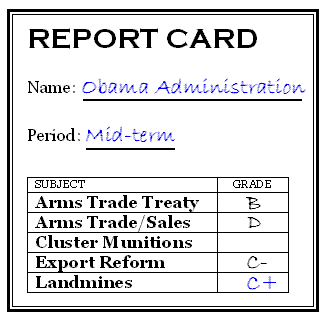By Jeff Abramson
Earlier this week, the public engagement staff at  the State Department's Office of Weapons Removal and Abatement sent out an email highlighting U.S.-supported efforts to clear landmines in Croatia, Sudan and Central America. There is no question that the United States is a global leader in these critical removal and assistance efforts, but is the Obama administration also moving Washington toward the global norm of barring use of victim-activated anti-personnel landmines? That answer is still unclear.
the State Department's Office of Weapons Removal and Abatement sent out an email highlighting U.S.-supported efforts to clear landmines in Croatia, Sudan and Central America. There is no question that the United States is a global leader in these critical removal and assistance efforts, but is the Obama administration also moving Washington toward the global norm of barring use of victim-activated anti-personnel landmines? That answer is still unclear.
Landmines: C+
As a presidential candidate, Barack Obama told Arms Control Today:
In general, I strongly support international initiatives to limit harm to civilians caused by conventional weapons.... As president, I will help lead the way on these issues. Our military has legitimate concerns on these issues, and I look forward to consulting closely with leadership at the Department of Defense as we shape policies on these key issues. At the same time, I recognize that our forces have been moving away from using cluster munitions and anti-personnel landmines ourselves, and these trends can be accelerated with targeted investments in innovative technologies.
In 2009, his administration followed through on the hint in those statements and launched a comprehensive review of its landmine policy and officially attended a Mine Ban Treaty states-parties annual for the first time. Those actions gave Mine Ban Treaty advocates hope that Obama would reverse the Bush administration's decision not the accede to the accord.
Last year, the path was cleared for a decision to support the treaty by a positive letter from 68 Senators, advocacy by nongovernmental organizations, actions by former military leaders, and a call by 16 Nobel Peace Prize laureates for their colleague President Obama to bring the United States in line with the global norm. To date, however, these calls have gone unheeded and the administration continues to review its policy.
As we hit the two-decade mark since the United States is known to have deployed new victim-activated anti-personnel landmines, arguments against acceding to the treaty look more and more dated.
While still the international leader in clearing landmines and helping those impacted by them, the United States gains little moral power as long as it remains outside the Mine Ban Treaty. With the support expressed last year for the treaty, including that of more than two-thirds of the Senate, the President was presented with a golden opportunity.
We're hoping the administration will soon make the right decision.
------
We're grading the Obama administration all week. ATT, arms trade/sales, and export control reform covered earlier... conclusion tomorrow with Indiscriminate Weapons, Especially Cluster Munitions.
Grading Guide
A: Global leader pressing for actions to curb arms races and set or reinforce highest international norms.
B: Working to raise or meet global norms. Breaking with past policies where appropriate.
C: Policies under review and may result in moving to meeting global norms, or may result in undermining them.
D: Falling behind global norms. Actions may exacerbate arms races, illicit proliferation or other threats to national and international peace and human security.
F: Actions undermining global norms and likely contributing to arms races or insecurity.
